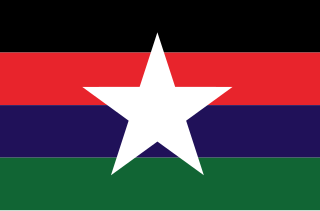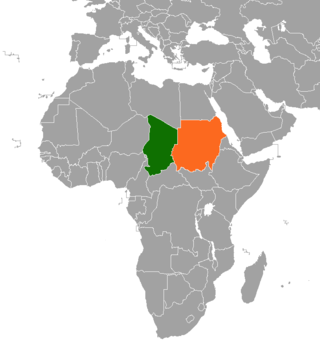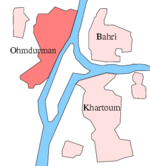
Omdurmán is a major city in Sudan. It is the second most populous city in the country, and thus also in the State of Khartoum. Omdurman lies on the west bank of the River Nile, opposite and northwest of the capital city of Khartoum. It is on the Nile river and acts as an important road hub, with the Nile boosting transportation even further.

The Justice and Equality Movement is an opposition group in Sudan founded by Khalil Ibrahim. Gibril Ibrahim has led the group since January 2012 after the death of Khalil, his brother, in December 2011. The JEM supported the removal of President of Sudan, Omar al-Bashir and nation-wide government reform.

The Sudan Liberation Movement/Army is a Sudanese rebel group active in Darfur, Sudan. It was founded as the Darfur Liberation Front by members of three indigenous ethnic groups in Darfur: the Fur, the Zaghawa, and the Masalit, among whom were the leaders Abdul Wahid al-Nur of the Fur and Minni Minnawi of the Zaghawa.

Khalil Ibrahim was a Sudanese insurgent leader who was the founder of the Justice and Equality Movement (JEM) which he led until his death. In the 1990s Ibrahim served in several state governments of Sudan.

The Chadian Civil War of 2005–2010 began on December 18, 2005. Since its independence from France in 1960, Chad has been swamped by civil wars between the Arab-Muslims of the north and the Sub-Saharan-Christians of the south. As a result, leadership and presidency in Chad drifted back and forth between the Christian southerners and Muslim northerners. When one side was in power, the other side usually started a revolutionary war to counter it.
The Alliance of Revolutionary Forces of West Sudan was formed on January 20, 2006, when the Justice and Equality Movement and the Sudan Liberation Movement merged to form a single rebel alliance in the Sudanese region of Darfur.
The Battle of N'Djamena took place between the forces of the revolutionary United Front for Democratic Change (UFCD) and the military of Chad that occurred on 13 April 2006 when rebel forces launched an assault on the capital of Chad in the pre-dawn hours, attempting to overthrow the government of President Idriss Déby Itno from their bases an estimated thousand miles east.

The War in Darfur, also nicknamed the Land Cruiser War, was a major armed conflict in the Darfur region of Sudan that began in February 2003 when the Sudan Liberation Movement (SLM) and the Justice and Equality Movement (JEM) rebel groups began fighting against the government of Sudan, which they accused of oppressing Darfur's non-Arab population. The government responded to attacks by carrying out a campaign of ethnic cleansing against Darfur's non-Arabs. This resulted in the death of hundreds of thousands of civilians and the indictment of Sudan's president, Omar al-Bashir, for genocide, war crimes, and crimes against humanity by the International Criminal Court.
General Mahamat Nouri is a Chadian insurgent leader who currently commands the Union of Forces for Democracy and Development (UFDD). A Muslim from northern Chad, he began his career as a FROLINAT rebel, and when the group's Second Army split in 1976 he sided with his kinsman Hissène Habré. As Habré's associate he obtained in 1978 the first of the many ministerial positions in his career, becoming Interior Minister in a coalition government. When Habré reached the presidency in 1982, Nouri was by his side and played an important role in the regime.
The Battle of N'Djamena began on February 2, 2008, when Chadian rebel forces opposed to Chadian President Idriss Déby entered N'Djamena, the capital of Chad, after a three-day advance through the country. The rebels were initially successful, taking a large part of the city and attacking the heavily defended presidential palace. They did not capture the palace, and after two days of fighting they withdrew to outside the city. Around two days later they retreated east.

The populations of eastern Chad and western Sudan established social and religious ties long before either nation's independence, and these remained strong despite disputes between governments. In recent times, relations have been strained due to the conflict in Darfur and a civil war in Chad, which both governments accuse the other of supporting.

The 2011–2013 protests in Sudan began in January 2011 as part of the Arab Spring regional protest movement. Unlike in other Arab countries, popular uprisings in Sudan had succeeded in toppling the government prior to the Arab Spring in 1964 and 1985. Demonstrations in Sudan however were less common throughout the summer of 2011, during which South Sudan seceded from Sudan, but resumed in force later that year and again in June 2012, shortly after the government passed its much criticized austerity plan.

The Sudanese conflict in South Kordofan and Blue Nile was an armed conflict in the Sudanese states of South Kordofan and Blue Nile between the Sudanese Armed Forces (SAF) and the Sudan People's Liberation Movement–North (SPLM-N), a northern affiliate of the Sudan People's Liberation Movement (SPLM) in South Sudan. After some years of relative calm following the 2005 agreement which ended the second Sudanese civil war between the Sudanese government and SPLM rebels, fighting broke out again in the lead-up to South Sudan independence on 9 July 2011, starting in South Kordofan on 5 June and spreading to the neighboring Blue Nile state in September. SPLM-N, splitting from newly independent SPLM, took up arms against the inclusion of the two southern states in Sudan with no popular consultation and against the lack of democratic elections. The conflict is intertwined with the War in Darfur, since in November 2011 SPLM-N established a loose alliance with Darfuri rebels, called Sudan Revolutionary Front (SRF).

Gibril Ibrahim Mohammed, sometimes spelled Jibril, is a Sudanese politician. He is the leader of the Justice and Equality Movement (JEM) since 2012, after the death of his brother, Khalil. In October 2020 he signed the Juba Peace Agreement. As a result Ibrahim has served as Minister of Finance of Sudan since February 2021. As leader of the JEM he was neutral in the 2023 War in Sudan from April until November, when he allied with the Sudanese Armed Forces.

The 2019–2022 Sudanese protests were street protests in Sudan which began in mid-September 2019, during Sudan's transition to democracy, about issues which included the nomination of a new Chief Justice and Attorney General, the killing of civilians by the Rapid Support Forces (RSF), the toxic effects of cyanide and mercury from gold mining in Northern state and South Kordofan, opposition to a state governor in el-Gadarif and to show trials of Sudanese Professionals Association (SPA) coordinators, and advocating the dismissal of previous-government officials in Red Sea, White Nile, and South Darfur. The protests follow the Sudanese Revolution's street protests and civil disobedience of the early September 2019 transfer of executive power to the country's Sovereignty Council, civilian prime minister Abdalla Hamdok, and his cabinet of ministers. Hamdok described the 39-month transition period as defined by the aims of the revolution.
The following lists events during 2023 in the Republic of the Sudan.

A civil war between two rival factions of the military government of Sudan, the Sudanese Armed Forces (SAF) under Abdel Fattah al-Burhan, and the paramilitary Rapid Support Forces (RSF) under Hemedti, began during Ramadan on 15 April 2023. Fighting has been concentrated around the capital city of Khartoum and the Darfur region. As of 21 January 2024, at least 13,000–15,000 people had been killed and 33,000 others were injured. As of 21 March, over 6.5 million were internally displaced and more than two million others had fled the country as refugees, and many civilians in Darfur have been reported dead as part of the 2023 Masalit massacres.
The following is a timeline of the War in Sudan (2023-present).
Wad Banda is a locality located in West Kordofan, Sudan.

The war in Sudan, which started on 15 April 2023, has seen a widespread of war crimes committed by both the Sudanese Armed Forces (SAF) and the Rapid Support Forces (RSF), with the RSF being singled out by the Human Rights Watch, and the United Kingdom and United States governments for committing crimes against humanity. The conflict was marked by heavy indiscriminate shelling, gunfire, and airstrikes on markets and populated residential neighbourhoods, causing a high number of fatalities. Hospitals were targeted during aerial bombings and artillery fire, and medical supplies were looted. These attacks severely impacted Sudan’s healthcare system, disrupting medical services and leaving the majority of the hospitals in conflict-affected states out of service. The UN declared Sudan the most dangerous country for humanitarian workers after South Sudan.














